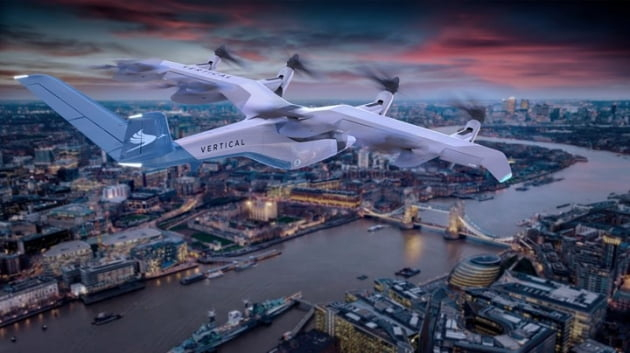Future mobility
LG’s telecommunication unit joins UAM race in Korea
LG Uplus teams up with GS Caltex, Kakao Mobility, Jeju Air, Pablo Air and Vertical Aerospace in Korea’s aim to commercialize UAM from 2025
By May 11, 2022 (Gmt+09:00)
4
Min read
Most Read
LG Chem to sell water filter business to Glenwood PE for $692 million


Kyobo Life poised to buy Japan’s SBI Group-owned savings bank


KT&G eyes overseas M&A after rejecting activist fund's offer


StockX in merger talks with Naver’s online reseller Kream


Mirae Asset to be named Korea Post’s core real estate fund operator



LG Group’s telecommunication unit joined the race for South Korea’s urban air mobility (UAM) to secure a future growth engine in cooperation with other companies.
LG Uplus Corp., the mobile carrier of the fourth-largest conglomerate by asset size, said on Wednesday it was set to enter into a business for next-generation aviation transportation system that will connect ground and air transports.
The company formed a consortium with a local refiner GS Caltex Corp., taxi-hailing app operator Kakao Mobility Corp., domestic budget airline Jeju Air Co., and a drone solutions company Pablo Air Co., as well as British UAM manufacturer Vertical Aerospace to participate in South Korea’s transportation ministry-led UAM project.
The Ministry of Land, Infrastructure and Transport in February launched the K-UAM Grand Challenge, a large-scale demonstration project to commercialize UAM from 2025. The ministry plans to select participants this year with a schedule to begin demonstration flights in open terrain next year.
LG Uplus will provide the transportation management system and communication service for the UAM safety within the consortium.
“We will prove mobile communication technologies such as the 5G system can supply high-quality service from ground to air,” said LG Uplus Chief Technology Officer Lee Sangyeob.
NEW GROWTH ENGINE
The UAM is expected to provide mobile carriers with a new growth engine as the telecommunication service provider can operate various mobility platforms for the future mobility system. The global UAM market is expected to surge to $1.5 trillion won by 2040 from $7 billion last year with an annual average growth of 30.7%, according to global investment bank Morgan Stanley.
Advanced air traffic communication helps aircraft to fly in the sky without collision. For the autonomous driving function, the UAM also needs smooth communication not only among aircraft but also between the transportation devices and the ground. Telecommunication service providers can support aircraft to process massive traffic data based on 5G mobile communication networks.
LG Uplus’ local competitors – SK Telecom Co. and KT Corp. – have already been working on the UAM business since telecommunication technologies are essential to the future mobility system. SK Telecom, the country’s top mobile carrier, teamed up with Tmap Mobility Corp., Korea Airports Corp., Hanwha Systems Co. and Korea Transport Institute. KT is cooperating with Hyundai Motor Co., Hyundai Engineering & Construction Co., Incheon International Airport Corp. and IGIS Asset Management Co.
KOREA TO LAUNCH COMMERCIALIZED UAM IN 2025, EXPAND IT FROM 2030
LG Uplus will cooperate in the establishment of UAM standards for South Korea, demonstrate the acceleration of the commercialization and search for additional business opportunities related to the UAM sector with partners.
LG Group affiliates are also poised to join forces from LG Sciencepark, the research and development hub of the group, as well as other units such as battery and motor units.
The mobile carrier is set to jointly conduct R&D with Pablo Air on a traffic management system that prevents collision of aircraft by monitoring and controlling all aircraft movements. It plans to verify proper coverage of mobile communication suitable for aircraft routes while securing communication quality for the UAM.
Kakao Mobility is expected to run a UMA platform based on its know-how for the operation of Kakao T, a transportation service app. The unit of the country’s leading online platform operator Kakao Corp. will set up solutions for a vertiport, a designated area where future mobility aircraft can make vertical takeoffs and landings, which implement automatic check-in and security inspection functions.
GS Caltex, the second-largest refiner in the country, plans to build vertiports, utilizing its gas station networks across the nation, which are expected to reduce the cost and time for construction. Gas stations are suitable for the facilities as their ceilings are open.
Jeju Air will operate the UAM service with its expertise in aviation, flight-related systems and manpower specialized in the industry.
Vertical Aerospace will produce the aircraft for the consortium while working on post-management of the aircraft and designing air routes. The British manufacturer has secured pre-orders for more than 1,350 units of electric vertical takeoff and landing (eVTOL) vehicles around the world. It is scheduled to conduct a test flight at the 2024 Paris Olympics.
South Korea aims to introduce the commercial UAM service in 2025 and expand it from 2030 with a goal to complete a one-seater prototype in 2023 and operate demonstration routes in downtown areas the following year.
The UAM system is predicted to provide transportation services between local airports and downtown areas. The system is free from traffic jams as it uses a sky path of 300 to 600 meters above ground with aircraft flying at a maximum speed of 300 kilometers an hour.
Write to Han-Gyeol Seon at always@hankyung.com
Jongwoo Cheon edited this article.
More to Read
-
 Future mobilityHyundai opens world's first UAM takeoff, landing area in UK
Future mobilityHyundai opens world's first UAM takeoff, landing area in UKApr 27, 2022 (Gmt+09:00)
1 Min read -
 Artificial intelligenceSK Telecom’s bet on air mobility, metaverse in full display at World IT Show
Artificial intelligenceSK Telecom’s bet on air mobility, metaverse in full display at World IT ShowApr 18, 2022 (Gmt+09:00)
3 Min read -
 Future mobilityLotte joins Korea’s UAM race as Hyundai closes ranks with others
Future mobilityLotte joins Korea’s UAM race as Hyundai closes ranks with othersNov 16, 2021 (Gmt+09:00)
3 Min read
Comment 0
LOG IN


